IB Spanish Ab Initio Writing Formats
1/15
There's no tags or description
Looks like no tags are added yet.
Name | Mastery | Learn | Test | Matching | Spaced | Call with Kai |
|---|
No analytics yet
Send a link to your students to track their progress
16 Terms
Artículo de opinión
Article
a. Name of Magazine
b. On right side indent — date. include authour on rights side too.
c. Heading/title
d. Introduction: 2 sentence introduction in general terms
e. Body: In 3 seperate pargaraphs develop ideas in signifiance
f. Conclusion: Sum up ideas without repeating intro, draw on conclusions, leave readers with something to question. No new ideas should be added.
Use formal spanish unless this is a school magazine. Include statistics, allusions, or evidence.
Diario
Date (in Spanish format: 8 de marzo de 2011)
b. Opening line (Querido diario)
c. Introduction (short, precise, informal, personal, in first person)
d. Body (informal, personal, in first person)
e. Closing line (informal)
f. "Farewell" line (informal)
g. Name or signature of person writing the entry (in Spanish)
h. Note: If the instructions specify that any other information should be included in the entry, make sure you include it. [Diary entries should always be informal, personal and written in first person (yo)]
correo electrónico formal (Usted)
a. Email address of the receiver (in Spanish) [Para:]
b. Email address of the sender (in Spanish) [De]
c. Subject (Asunto in Spanish and relevant to the task)
d. Date, if you are asked to include it (in Spanish format: 8 de marzo de 2011)
e. Opening line and name of the person in Spanish (Ex. Estimado Señor)
f. Short Introduction
g. Body
h. Closing line (Ex. Gracias por su atención)
i. "Farewell" line (Ex. Cordialmente)
j. Name or signature of person writing the email (in Spanish)
correo electrónico informal (Tú)
a. Email address of the receiver (in Spanish) [Para]
b. Email address of the sender (in Spanish) [De]
c. Subject (Asunto in Spanish and relevant to the task)
d. Date, if you are asked to include it (in Spanish format: 8 de marzo de 2011)
e. Opening line and name of the person in Spanish (Ex. Quierdo:)
f. Short Introduction
g. Body
h. Closing line (Ex. Escríbeme pronto)
i. "Farewell" line (Ex. Un abrazo)
j. Name or signature of person writing the email (in Spanish)
cartas formales (Usted)
a, Address of the receiver in Spanish (Ex. Calle de las Flores 32 Piso 4, Apto 5 08035 Barcelona, España)
b. Date (in Spanish format: 8 de marzo de 2011)
c. Opening line and name of the person in Spanish (Ex. Estimado Señor)
d. Introduction of letter
e. Body
f. Closing line (Ex. Agradezco mucho su atención)
g. "Farewell" line (Ex. Atentamente)
h. Name or signature of person writing the letter (in Spanish)
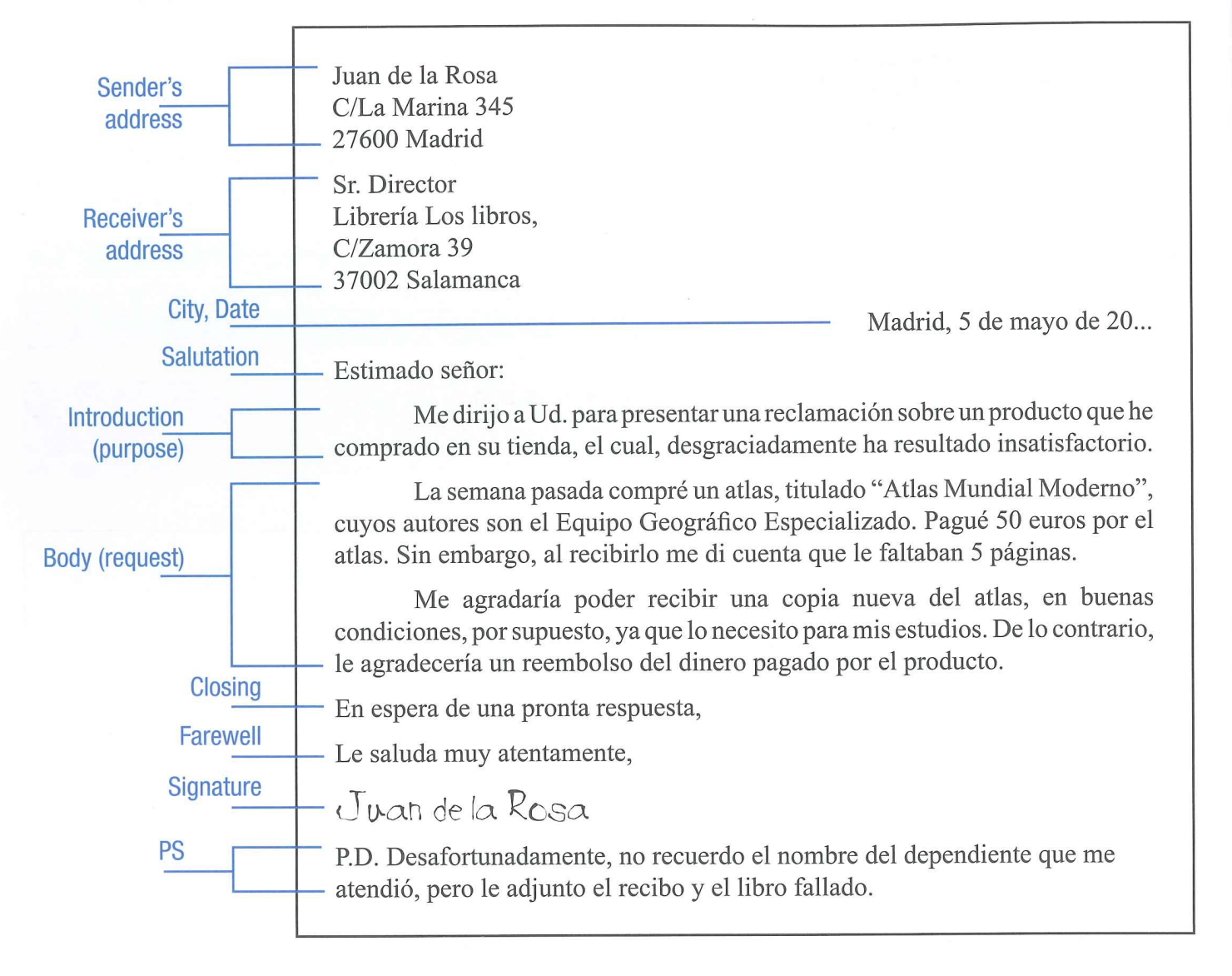
cartas informales (Tú)
a. Address of the receiver in Spanish (preferably of a Spanish country)
b. Date (in Spanish format: 8 de marzo de 2011)
c. Opening line and name of the person in Spanish (Ex. Querido Clara:)
d. Introduction of letter
e. Body
f. Closing line (Escríbeme pronto)
g. "Farewell" line (Ex. Abrazos)
h. Name or signature of person writing the letter (in Spanish)
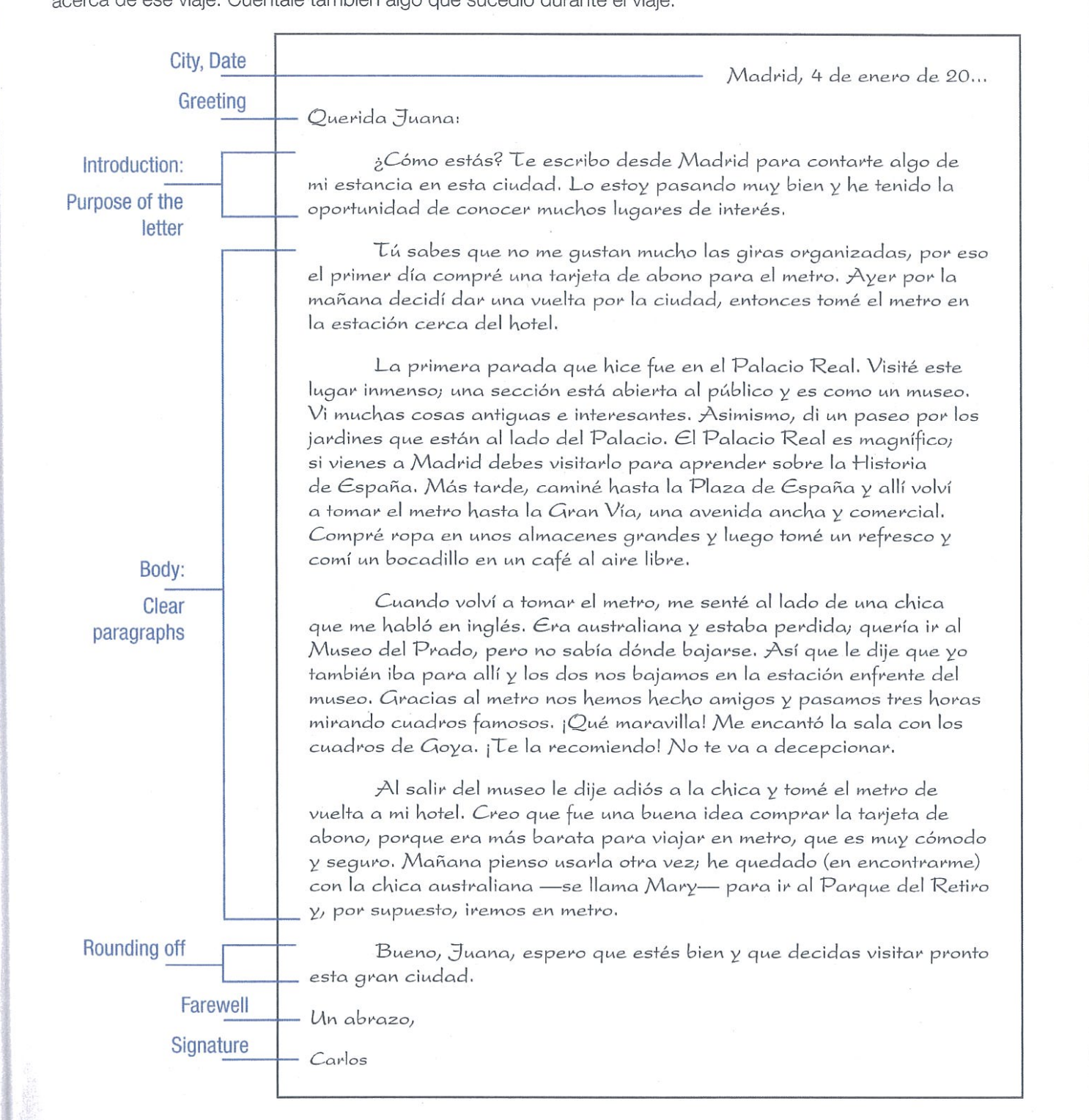
postal
a. Address of the receiver in Spanish (preferably of a Spanish country)
b. Date (in Spanish format: 8 de marzo de 2011)
c. Opening line and name of the person in Spanish (Querido:)
d. Brief Introduction (this is a postcard not a letter; Como estás?)
e. Body
f. Closing line (Ex. Nos vemos pronto.)
g. "Farewell" line (Ex. Un beso)
h. Name or signature of person writing the letter (in Spanish)
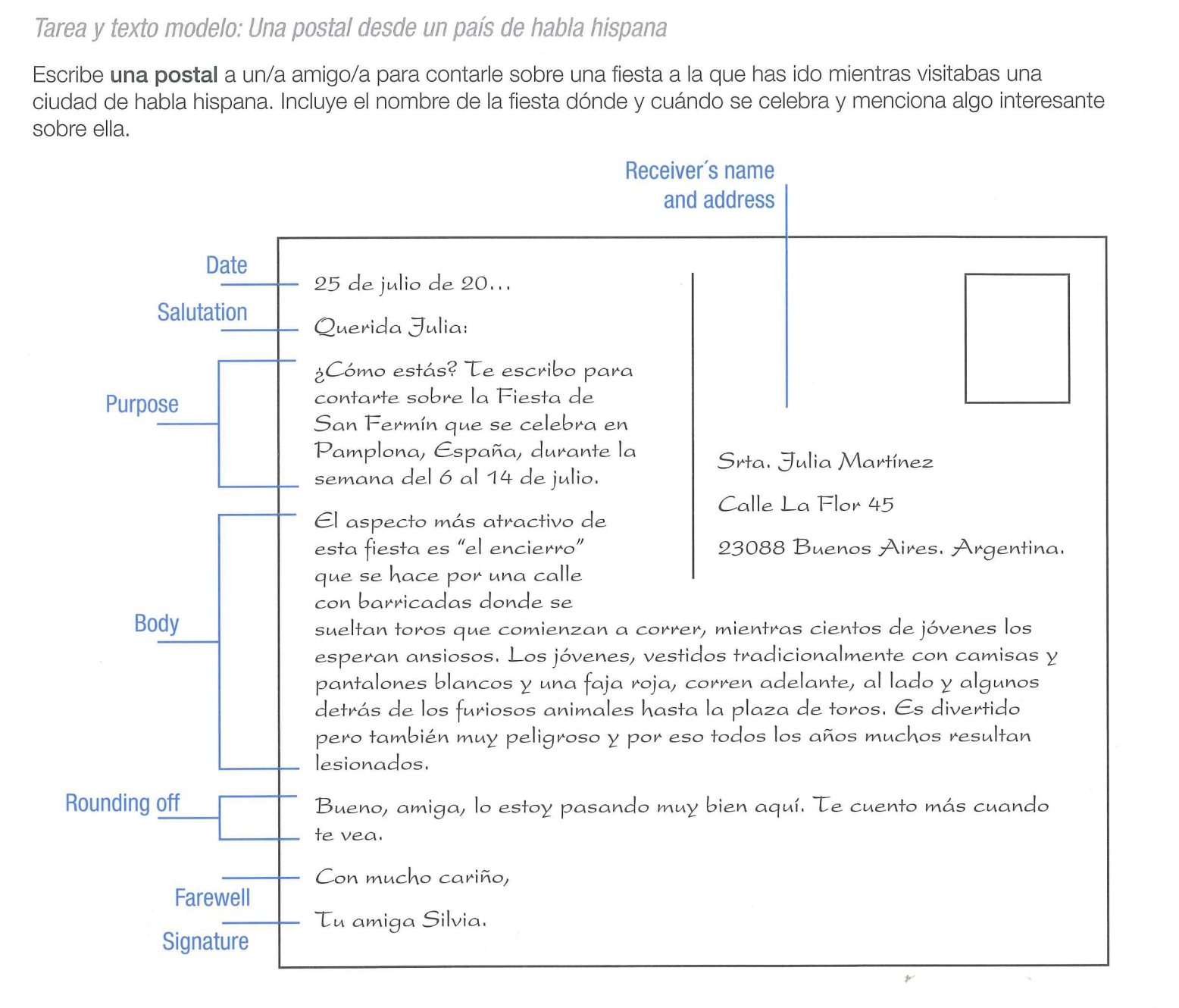
folleto
Clear and attractive titles and subtitles.
A short introductory paragraph
Information in bullet points.
Catchy phrases using exclamation marks and/or question marks.
End with a catchy phrase, slogan, or summary.
Optional: "Para más información visite la página web www.yyyyy.com"
entrevista
a. header of title, date and location of interview
b. intro to outline interviewee
c. document the interview as dialogue
d. conclusion statement to interview thanking interviewee
nota
a. informal greeting (Ex. Hola mamá)
b. reason for note
c. info needed in bullet point
d. saludo informal (Ex. Gracias! Te quiero)
presentación
a. title
b. intro
b. body (Ex.Para empezar,)
c. closing (Ex. Finalmente,)
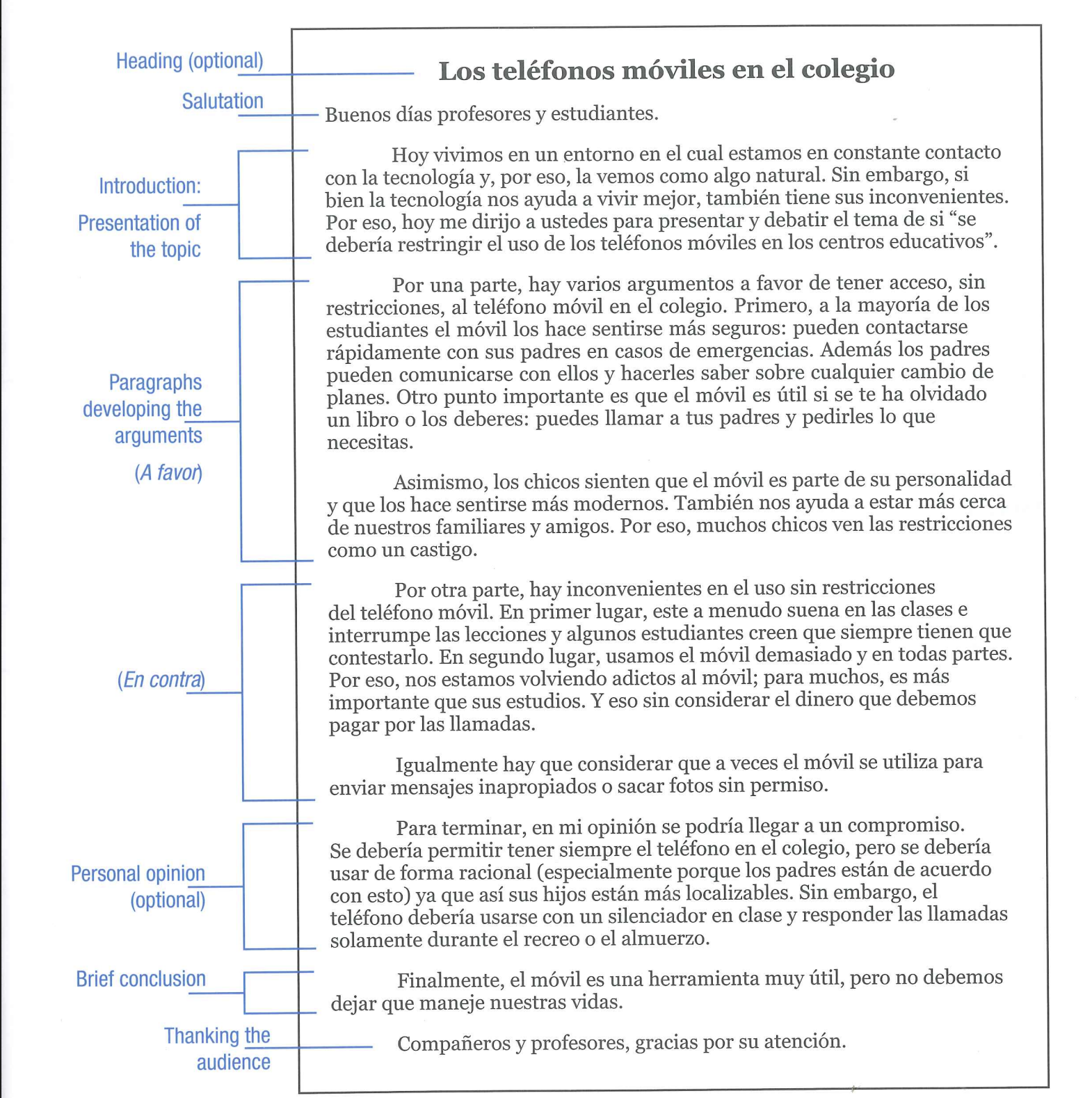
anuncio (ad)
a. Title
b. short intro
c. Numbered list, prices, descriptions
d. closing line (Ex. No pierdas esta gran oportunidad!)
e. contact info (Ex. Para mas informacion...)
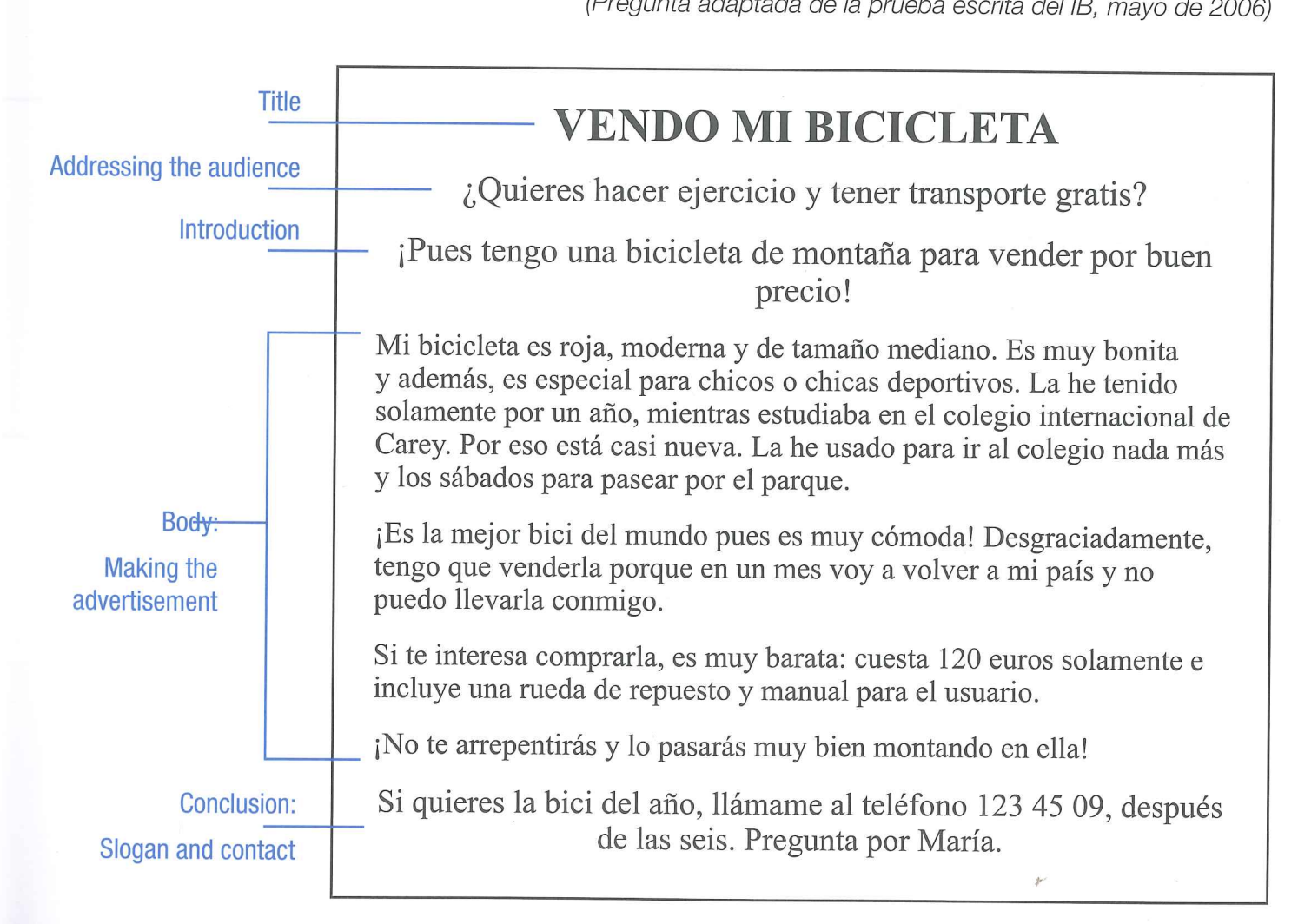
blog
Link
Blog title and subject
Entry title
Date/hour
Author (por ___)
Greeting (Ex. Hola queridos lectores!)
introduction (mention topic)
Body
Conclusion
Invitation to comment (Si te interesa este tema, deja un comentario!)
Interactive comments made by public:
Escribe aqui tu commentario:
(insert name) dijo…
date
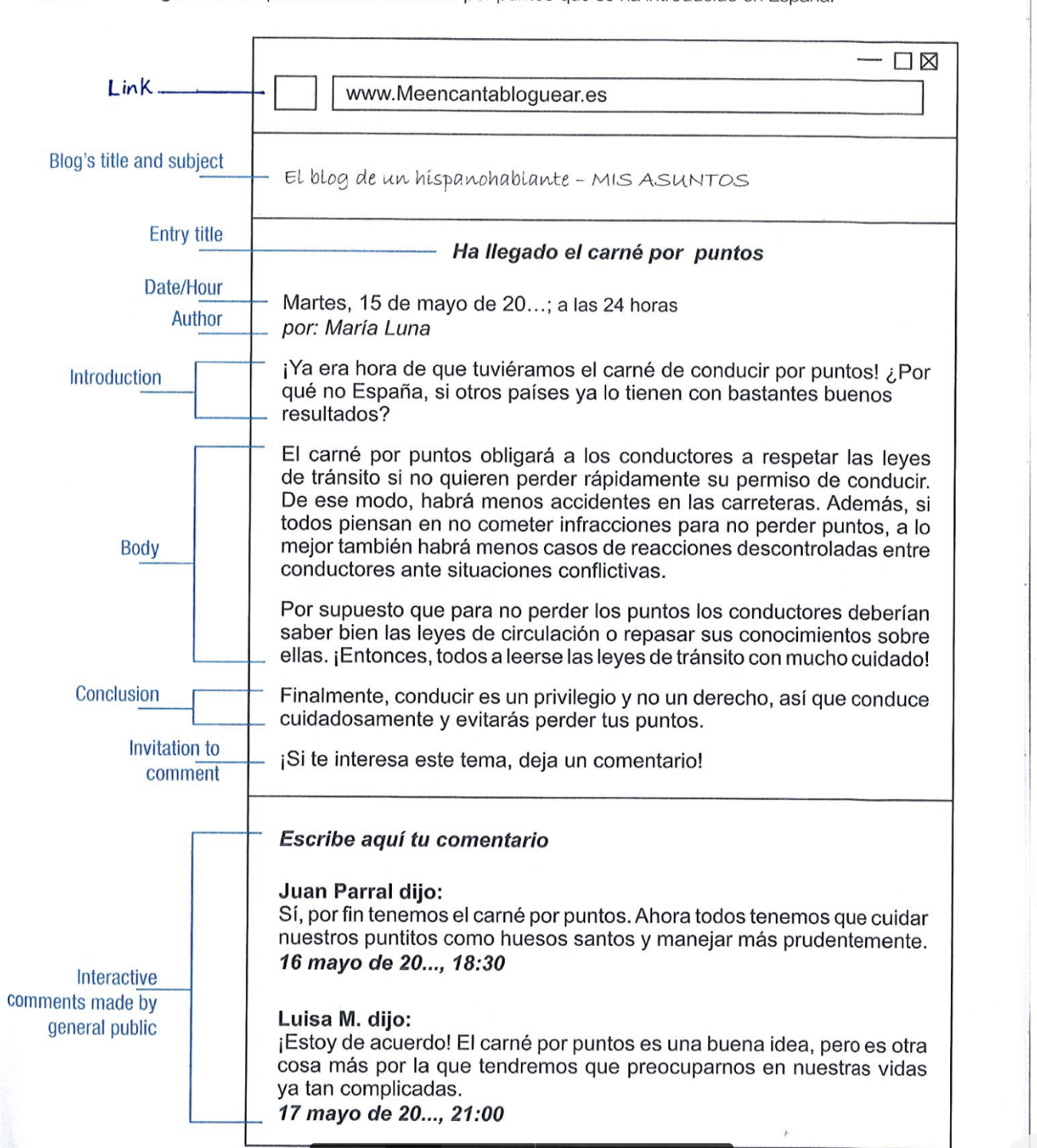
poster (cartel/afiche)
Clear and attractive titles and subtitles.
A short introductory paragraph
A clear and concise explanation of particular information, usually in bullet points.
Catchy phrases using exclamation marks and/or question marks.
End with a catchy phrase, slogan, or summary.
Phrases with exclamation points (ex: ¡Anímate!)
Optional: "Para mas información visite la página web www.yyyyy.com"
Lista/Conjunto de instrucciones
Title:
Introduction and Purpose: Start with sentence introducing the topic and recommendations with reasons.
Body/List: Details of the recommendation and information. Can be presented in point form but needs to include verbal forms.
Conclusion: End the list by writing a summarising statement. If applicable, you can finish with a call to action to readers.
useful vocab: evitar, comportamiento, aunque, deber, hay que, tener que
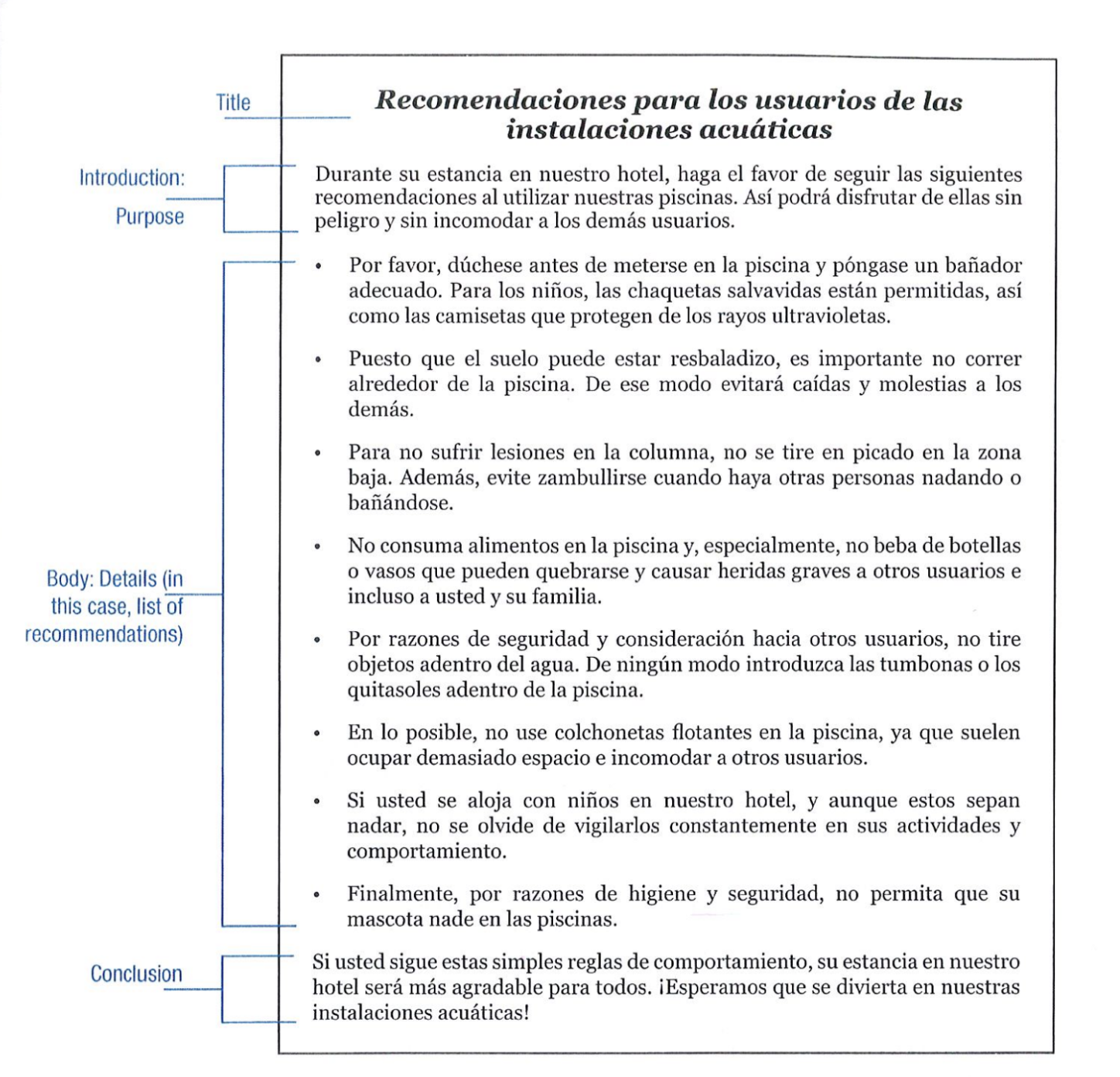
Articulo informativo
Name of magazine
Date on right side of page
Title
Author (on right side)
Introduction: Background statements. Use “Que” “Quien” “Cuando” or “Donde” to establish article purpose
Body paragraph: 3 seperate paragraphs, developing ideas. Make each paragraph a different idea.
Conclusion: Write a closing statement with final thoughts on topic.
This format is used to focus on current issues.